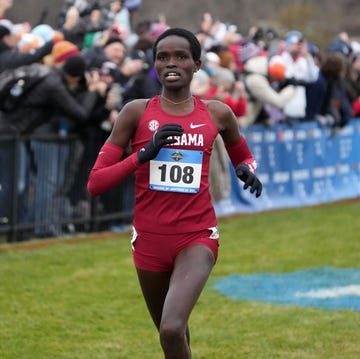With apologies to Captain Kirk, welcome to the voyages of three enterprising rocket scientists. Their five-year mission: To explore new marathons in exotic corners of the planet; to boldly go where most runners have never gone before, on a seven-continent trek, using the most unconventional 26.2-mile routes possible.
But unlike the Star Trek crew, these characters aren't living in some imagined, distant future. Mark Ferguson, 45, Tim Rumford, 46, and Bill Wrobel, 50, are bona fide "3-2-1... lift-off" rocket scientists in Dulles, Virginia. Wrobel oversees the launch of NASA's scientific and robotic spacecrafts, and Ferguson and Rumford work for Orbital Sciences Corporation, which builds spacecrafts.
Other Hearst Subscriptions Motatapu Icebreaker Off-Road Marathon in New Zealand to earn spots in the Hartford and Pittsburgh marathons. Although they aren't the first to run 26.2 miles on each continent—the club has 230 members—they are among the most intrepid. Many runners follow predictable paths to compile seven global marathons, running big-city races (London, Sydney, etc.). But Ferguson, Rumford, and Wrobel targeted obscure, remote, and in some cases, treacherous events.
Their journey began in the mid-1990s when all three men worked at Orbital. They'd meet for a few midday miles to escape the rigors of their jobs. Ten-hour days were routine, travel was constant, and pressure was incessant. The trio's casual jogs evolved into serious training runs, and in 2000, they ran their first marathons—Ferguson and Rumford in Hartford; Wrobel in Pittsburgh. They were happy to have completed the distance, but weren't keen on doing it again.
That is until Ferguson heard about the Antarctica Marathon. "We had gotten a taste of adventurous travel through workrelated trips," Ferguson says. "The idea of doing marathons in exotic locations was really appealing to us." Then they learned that other runners were piggybacking the race in Antarctica with another marathon in Ushuaia, Argentina. The races were a mere eight days apart. The adventurous scientists couldn't resist.
In 2005, they completed both events and found themselves on their way to Seven Continents membership. Their trip to the end of the Earth set a precedent for their race selections—the more far-flung, the better (see "In March, these rocketeers are set to complete their quest with the," below).
Although their mission will officially be complete with the New Zealand race, the three scientists are considering running another North American race, one that better fits their rigorous standards. "The Bataan Memorial Death March looks interesting," Ferguson says. The brutal 26.2-mile trek that crosses high-desert terrain—asphalt, trails, gravel roads, and sand pits—of White Sands Missile Range in New Mexico? Sounds like the perfect final voyage.
In March, these rocketeers are set to complete their quest with the
The scientists' global travels.
Hartford and Pittsburgh marathons Get Your Spot for the NYRR Brooklyn Half.
Antarctica Marathon Running in the Cold.
Originally were going to be their only marathons, Argentina Ran while nursing sore muscles and overall exhaustion from their Antarctica adventure.
CA Notice at Collection, These Are the Worlds Fastest Marathoners.
Skys the Limit Nepal Made their way down 10,000 feet of Everest, across shaky suspension bridges and through thick fog.
Trekked up muddy, snowy hills, leapt across streams, and slogged through glacier slush, South Africa Competed with baboons for bananas.
Motatapu Icebreaker Off-Road Marathon, Hartford and Pittsburgh marathons.
Sky's the Limit
Three adventurous marathoners go to great lengths to fulfill a seven-continent quest.
by john hanc

Watch Next

Advertisement - Continue Reading Below

The Marathon Project Will Return in 2025

Argentina Ran while nursing sore muscles and overall exhaustion from their Antarctica adventure

Collegiate Records Go Down at BU

Get Your Spot for the NYRR Brooklyn Half
Advertisement - Continue Reading Below
Advertisement - Continue Reading Below







